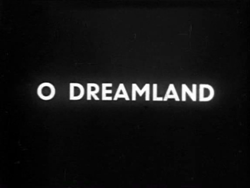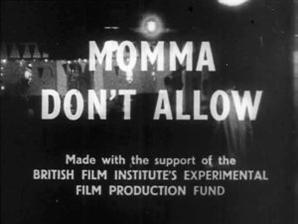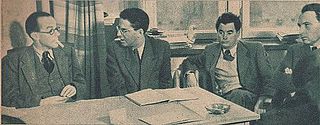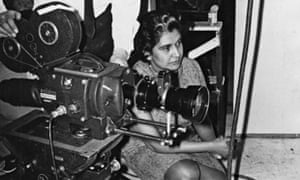Related Research Articles

The oldest known surviving film was shot in the United Kingdom as well as early colour films. While film production reached an all-time high in 1936, the "golden age" of British cinema is usually thought to have occurred in the 1940s, during which the directors David Lean, Michael Powell, and Carol Reed produced their most critically acclaimed works. Many British actors have accrued critical success and worldwide recognition, such as Audrey Hepburn, Olivia de Havilland, Vivien Leigh, Glynis Johns, Maggie Smith, Laurence Olivier, Michael Caine, Sean Connery, Ian Mckellen, Joan Collins, Judi Dench, Julie Andrews, Daniel Day-Lewis, Gary Oldman, Emma Thompson, Anthony Hopkins, Peter O’Toole and Kate Winslet. Some of the films with the largest ever box office returns have been made in the United Kingdom, including the fourth and fifth highest-grossing film franchises.

John Edward Boulting and Roy Alfred Clarence Boulting, known collectively as the Boulting brothers, were English filmmakers and identical twins who became known for their series of satirical comedies in the 1950s and 1960s. They produced many of their films through their own production company, Charter Film Productions, which they founded in 1937.

The Wednesday Play is an anthology series of British television plays which ran on BBC1 for six seasons from October 1964 to May 1970. The plays were usually original works written for television, although dramatic adaptations of fiction also featured. The series gained a reputation for presenting contemporary social dramas, and for bringing issues to the attention of a mass audience that would not otherwise have been discussed on screen.

The Grove Family was a British television series soap opera, generally regarded as the first of its kind broadcast in the UK, made and broadcast by the BBC Television Service from 1954 to 1957. The series concerned the life of the family of the title, who were named after the BBC's Lime Grove Studios where the programme was made.

Paul Rotha was a British documentary film-maker, film historian and critic.

O Dreamland is a 1953 documentary short film by British film director Lindsay Anderson.
Ian Dalrymple was a British screenwriter, film director, film editor and film producer.

Momma Don't Allow is a 1956 short British documentary film co-directed by Karel Reisz and Tony Richardson, and filmed by Walter Lassally. Produced by the British Film Institute Experimental Film Fund, it was first shown in February 1956, as part of the first Free Cinema programme at the National Film Theatre.
War Requiem is a 1989 film adaptation of Benjamin Britten's musical piece of the same name.

Basil Charles Wright was an English documentary filmmaker, film historian, film critic and teacher.
Christmas Under Fire is a 1941 British short documentary film directed by Harry Watt for the Crown Film Unit of the Ministry of Information. It was conceived as propaganda primarily for an American audience, to raise support for the Allied cause during the Second World War. Produced in the context of German bombings of British cities, it depicts the resilience of British civilians despite the hardships they suffered during the 1940 Christmas, by showing the continuation of Christmas traditions in the face of the disruptions caused by war. The film is a sequel to London Can Take It!, with the same narrator, Quentin Reynolds. It was nominated for an Academy Award for Best Documentary Short, which was won by Churchill's Island.
San Francisco was an impressionistic documentary film directed by Anthony Stern. The film, cut to a version of "Interstellar Overdrive" as performed by Pink Floyd in 1966, pioneered the use of 16 mm single frame cinematography in the late 1960s and went on to win awards for cinematography at the Oberhausen, Melbourne and Sydney Film Festival.

Stuart Legg was a pioneering English documentary filmmaker. At the 14th Academy Awards in 1941, Legg's National Film Board of Canada film Churchill's Island became the first-ever documentary to win an Oscar.
Sidney Henry Cole was a British film and television producer. Earlier in his career he worked as a film editor.
Stewart McAllister was a British documentary film editor who collaborated closely with Humphrey Jennings during the Second World War to produce films for the Crown Film Unit of the Ministry of Information. His contributions towards these films was largely neglected until Dai Vaughan's biography of him, Portrait of an Invisible Man, was published in 1983.
The Battles of Coronel and Falkland Islands is a 1927 British docudrama film directed by Walter Summers. The film focuses on the naval warfare around the Battle of Coronel and Battle of the Falkland Islands during the First World War. It was the last in a successful series of documentary reconstructions of First World War battles by British Instructional Films made between 1921 and 1927. The film was produced at Cricklewood Studios and on location off Malta and the Isles of Scilly. The film is an entirely fictional recreation with a strong documentary feel.
The BFI Production Board (1964-2000) was a state-funded film production fund managed by the British Film Institute (BFI) and "explicitly charged with backing work by new and uncommercial filmmakers." Emerging from the Experimental Film Fund, the BFI Production Board was a major source of funding for experimental, art house, animation, short and documentary cinema, with a continuing commitment to funding under-represented voices in filmmaking.

Sarah Erulkar was a prolific and multi-award-winning Indian-born Jewish British filmmaker, specialising in sponsored documentary shorts.
Donald Alexander (1913–1993) was a British documentary film-maker who worked as producer, director, writer and editor of films documenting social and industrial conditions, most notably in the coal-mining industry, between the 1930s and 1970s. The movement of which he was part is now regarded as the golden age of British documentary. Its leading figures also included Paul Rotha, John Grierson, Edgar Anstey, Humphrey Jennings, Basil Wright and Arthur Elton.
Housing Problems is a 1935 British documentary film produced by the Realist Film Unit for the British Commercial Gas Association. The fourteen-minute film documents the poor living conditions experienced by slum housing tenants in the East London district of Stepney, combining narration with interviews of tenants. It emphasises the role of the British Commercial Gas Association in providing social housing, interviewing residents of new housing projects about their improved conditions as well as displaying architectural models of housing estates planned by local authorities.
References
- 1 2 "Builders (1942)". Screenonline . BFI . Retrieved 11 April 2012.
- 1 2 Chapman, J. (11 March 2015). A New History of British Documentary. Springer. ISBN 9780230392878.
- ↑ Barsam, Richard Meran (1992). Nonfiction Film: A Critical History. Bloomington, IN: Indiana University Press. p. 184. ISBN 9780253207067.